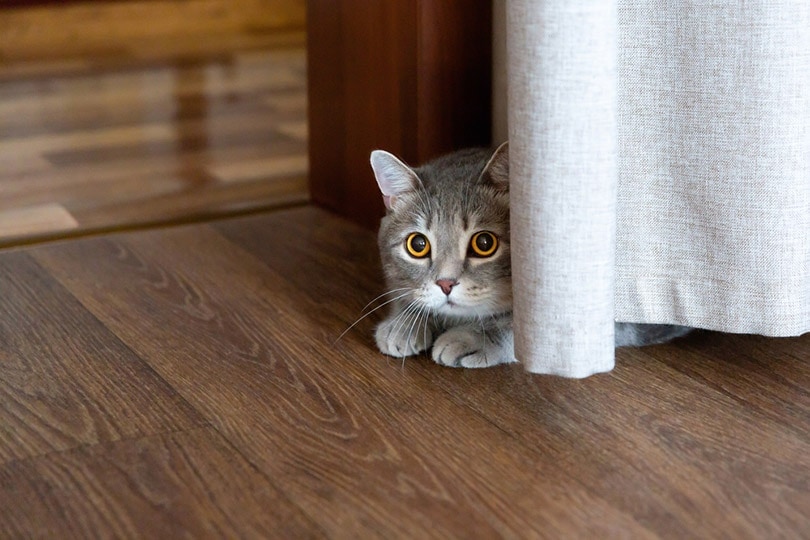How Long Will a Cat Hide If They’re Scared? What You Need to Know
By Ashley Bates
Updated on

Whenever something happens that’s out of the ordinary, most cats are quick to jump for cover. Whether it is an unfamiliar face or loud noise—they run for the hills. These animals can efficiently maneuver in high-stress situations, so they will be gone at record speeds.
But just how long is it normal for a cat to hide if they’re scared? This depends on a variety of factors. Some cats only hide for a few minutes, while others take cover for quite a long time. Here, we will discuss how long a cat should hide and how you can create a safe space for them.
Why Do Cats Hide?
Cats hide for a number of reasons, and these can vary from cat to cat. Usually, though, cats hide when anything happens outside of their comfort zone.
Some felines are terrified of anyone else other than their owners. It takes others a lot to get worked up. Some will fear thunderstorms, others will fear the vacuum. Some don’t like the new baby anytime it cries or fusses. Others don’t like the weird hair band on the ground.
It’s pretty easy to tell when your cat is scared of something, so you know their triggers better than anyone. But typically, sudden hiding has to do with environmental change that you are aware of as well, such as moving or bringing a new animal or person into the house.

How Long Will a Cat Hide?
The length of time a cat will hide just depends on the circumstance and how scared they are. Some cats only hide for a few minutes, while others take cover for quite a long time, if they think it’s necessary—which can last hours or days.
It can be tricky to find your cat, but it is important to do so. As long as you know where they are hiding, you can take measures to help them until they are more secure.
Welcoming a New Cat to the Home
If you bring a new cat home and they’re hiding immediately, this is perfectly normal. You’ll definitely want to keep note of where they are, but give them their time and space. New cats will acclimate in the first 2 weeks, and hiding should subside.
In this scenario, the best thing to do is only to initially give cats access to a small portion of the house. The hiding behavior should gradually stop as they get used to their surroundings.
Here are some ideas to warm them up:
- Make introductions slow
- Acknowledge body language
- Talk in a soft, reassuring voice
- Let them come to you
- Give them yummy treats
If you carefully observe the cat’s behavior, you can gauge how to approach them.

Concerns With Cats Hiding
Your cat hiding probably isn’t cause for major concern unless it starts interfering with their ability to live comfortably in the home. Here are some areas hiding too frequently can impact.
Eating/Using the Bathroom
One of your primary concerns with cats hiding is their ability to eat and use the bathroom. If they’re hiding for long periods or don’t feel like they can come out, it could cause accidents, weight loss, and dehydration.
Your cat should feel like they can freely go to and from the food dishes and litter box at their leisure. If they no longer come into the main spaces to do either one of these activities, some adjustments will need to be made.
Until they are comfortable, you could put the litter box and food dishes in the room they choose to hide, especially when bringing a new cat into the house. This will give them all of their basic necessities while ensuring the environment is calm and chaos-free.

Lack of Socialization
Cats can develop long-term issues with trust and might be more withdrawn. This can impact the relationship between the two of you and other household members. If your cat is constantly hiding, they need to get proper socialization.
The longer this goes on, the more impactful it might be—so make sure to correct the problem before it gets out of hand.
Long-Term Anxiety
If something is going on in the home that your cat cannot get used to, it can cause problems with anxiety. Some cats will be more inclined to nervous behavior than others. If these tendencies are not fostered correctly, it can become an ongoing problem.
If anxiety is the culprit, there are ways you can try to appeal to your cat-specific personality quirks. However, sometimes, it requires medication from your veterinarian.
In addition to hiding, other signs of anxiety include:
- Increased respiration
- Crouching away
- Ears back
- Aggression
- Hair standing up
- Freezing
- Tail held against body
- Avoiding eye contact
Some medication will only need distribution when anxieties are high such as if you’ve moved, had a baby, or another household change has happened. Other times, anxiety can be chronic and lifelong, requiring continual treatment.

Hiding Indoors vs. Outside
It’s one thing if your cat is hiding indoors where you know they’re safe. It’s quite another if they’ve darted off somewhere outside and you can’t seem to find them. Because if they are outside, there is a very good chance they are just hiding somewhere local, but they might have run off.
Not knowing the difference can be very alarming for owners. If your cat is unfamiliar with the territory, you should always keep them inside. Any stimuli in the outside world could spook them, causing them to run for cover.
If they are unsure of where they are, it might be very complicated for them to find their way back to you. Anytime your cat is outside, it’s a good idea to introduce them slowly and make sure there’s no direct threat.
Some folks choose to buy GPS systems and other tracking devices just in case. Or, you could opt for general services like microchipping. Also, wearing a collar with an up-to-date set of tags and info can help if your cat is ever lost.
How to Keep Your Cat From Hiding
If you notice your cat hiding recently, or it’s a frequent problem for them, you can make some changes to create a safer environment for them.

Reduce Stress
If something is causing anxiety in your cat’s environment, try to adjust the situation to meet the needs of all involved. For example, if your cat is afraid of the dog, try to create separate spaces and boundaries until everyone is comfortable.
Remove Triggers
If you know something is upsetting to your cat, keep it as far away from them as possible. They might take cover if you turn on the vacuum cleaner or hair dryer, as these are quick events that will pass in no time.
However, if your cat is frantic about other home inhabitants, it might be more challenging. Try to separate your cat as best as possible and ensure you’re reassuring them when they’re around.
Demand Respect
Since you are the owner, you are ultimately responsible for the well-being of your animal. If that means addressing other behavioral issues in the household, it is your job to do so.
If the anxiety is coming from another household member or animal, you have to demand that they respect your cat. That means disciplinary training for dogs who might be bullying your cat and proper training for small children.

When Hiding Is a Concern
Sudden behavioral changes like this can indicate that your cat is sick and in need of attention. So when is hiding a concern? If you’ve had your cat for quite a while and nothing has changed to your knowledge, it might be time to get them to the vet.
When you take them in for their appointment, your vet will run standard tests on them, which might include blood work, a physical exam, and additional testing if needed. Even though it might be nothing, several health issues could lead to a shift in behavior.
Conclusion
So, depending on the situation, if you let them, your cat might hide for just a few minutes or several days. What is normal and not normal depends on how long you’ve had your cat, any changes in the home, and overall personality.
If you feel concerned about your cat’s behavior, always follow up with your veterinarian to ensure you acknowledge any important and time-sensitive issues. It’s always best to be safe rather than sorry.
Related Read:
- How Do I Get a Scared Kitten to Trust Me? 11 Expert Tips
- How to Lure a Cat Out of Hiding: 6 Vet Approved Steps
Featured Image Credit: Chendongshan, Shutterstock











